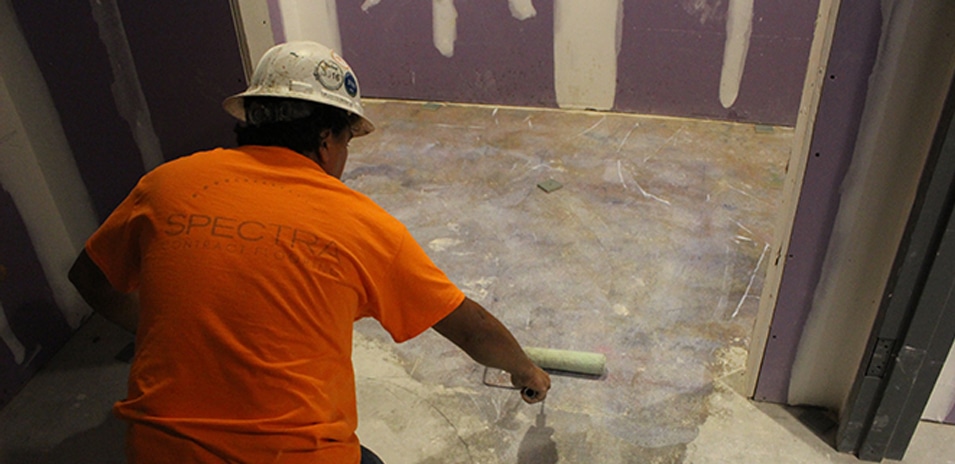Scheduling conflicts and 5 other problems general contractors shouldn’t have when it comes to their commercial flooring subcontractor
When Cory Money worked as a project manager for Dutson Builders, he oversaw the construction of $3-5 million corporate offices, call centers and more — and experienced all the ways that a good commercial flooring subcontractor can make or break a job.
These days, he applies those lessons in his current position as president of Spectra’s Salt Lake City branch.
We sat down with Money to get his perspective from both sides of the fence.
After all, he knows exactly what an ideal relationship with a skilled flooring contractor should look like, and why.
These qualities include:
- Thorough consultations to fully understand your needs
- Complete but competitive bids that help you secure projects
- In-house scheduling and coordination that take the pressure off
- Strong financial backing that prevents subcontractor default
- Skilled installation teams who ensure the jobs gets done right
- Clear and constant communication that keeps you in the loop
1. Feeling understood
Good flooring contractors don’t settle for writing bids based just on a paper scope. They take the time to familiarize themselves with you and your project, including finding opportunities to add value.
While business perks like lunch and golf trips are fun, it’s important to pay attention to how much thought and consideration your potential new flooring contractor shows in the actual job itself. This starts with open communication through phone calls and email check-ins to answer questions relevant to your project.
During this process, your flooring subcontractor should verify how the work will get done. This means giving special considerations to best-fit materials for your design preferences and performance requirements, product availability, compatibility and even small details such as whether adjacent flooring will vary in thickness.
Ideally, the contractor will also make time to visit your proposed job site — “walking the job” — to verify that the initial scope is accurate.
Such visits help identify capacity limitations for staging materials, waste disposal logistics and more.
If this seems like a lot of extra energy spent on a project before a contract ever gets signed, well, it is. But that’s a good thing.

2. Bids that mirror your project’s reality
Low bids are appealing at first glance, but the onus falls on you as a general contractor to look for holes. They may reflect an incomplete estimate or lack of expertise, which means overlooking aspects of the job that can hurt your bottom line and credibility.
When considering a contractor who’s already familiarized themselves with your project, you can expect their bid to reflect that research.
One hallmark of expertise is someone whose bid considers issues absent from the original scope.
“Some flooring contractors will look at a scope and say, ‘Well, it doesn’t say that we have to have a moisture membrane.’ But if the slab still has moisture on it and we put glue on it, it won’t cure and the floor will pop up,’” said Money. “As flooring professionals, we should make our general contractors aware of everything potentially associated with the job, to look them in the eye and make them understand that we see these potential needs.”
For a more thorough guide to identifying the red flags associated with incomplete bids, read this article.
Generally, a thorough bid should at least include the following:
- Necessary waterproofing measures to avoid costly damages in the future
- Moisture testing to prevent mold, adhesive failure and performance issues like bubbling or delamination
- Removal of incompatible adhesives to reduce risk of flooring incompatibilities on renovation jobs
- Identifying scoped products or services that don’t fit your job
3. Coordinating multiple installation teams
Scheduling is one of the most difficult, time-consuming aspects of being a general contractor. When contact points get simplified, your job does, too.
On big commercial jobs with diverse flooring needs, it’s much easier to hire one contractor who can coordinate and handle multiple flooring applications. This single subcontractor absorbs the downline responsibilities.
“Any time you can get one contractor that’s willing to do it all, it just makes your life so much easier. That’s something we really focus on at Spectra,” said Money. “Some flooring places won’t do that, especially when it comes to specialties like polished concrete. That gives us a competitive edge — one where we don’t necessarily have to be the lowest price because there’s a value that comes with our complete scope.”
That means no more piecemeal hires for concrete, tile, carpet and vinyl — and less wasted time managing schedule conflicts.
“In a turnkey flooring scope, we don’t have coordination issues. We don’t have a potential for schedule delays — it’s all inside one company that controls everything,” said Money. “Our team looks at a project and says, ‘Okay, we want to do it in this particular sequence and we’re going to start in a month.’ We contact the floor polish guy and the tile guy and the carpet guy and say when to come.”
And when there’s a conflict, that’s on the subcontractor to resolve — the GC never has to worry about it.
“It’s complete. There’s no finger-pointing. It’s easy on a superintendent, it’s easy on a project manager, said Money. “Companies like Spectra still have to do their part to be competitive, but if we’re competitive and can offer that broader scope? That’s a slam dunk for a general contractor.”
4. Anyone else’s finances but your own

Default is a major problem that’s best avoided by verifying your subcontractor’s finances.
“A lot of the time, we get invited to bid on bigger projects because they know that we can afford to do the job. Smaller flooring guys might come in with a cheaper price, but they don’t have the credit capability to go out and order $8 or 10 million worth of product and wait to get paid on it,” said Money.
We have the financial resources and bonding capacity to deliver on huge multi-million-dollar projects — whether that’s installing a $1.5-million hospital floor or executing the diverse flooring demands of a $200-million luxury condo building.
The value of financial resilience isn’t just limited to on-time material purchases and deliveries. It’s also essential for building a reliable, skilled installation crew.
“This backing also ensures our ability to secure stable labor. We don’t believe in telling employees, whether they’re full-time or contract hires, ‘You’ll get paid when we get paid,’” said Money.
We pay our installation crews every Friday — and those checks never bounce.
Because of this, Spectra isn’t just able to find highly skilled installation teams. We also secure their loyalty year after year.
5. Securing the best team for the job

While strong financial backing helps ensure labor stability, these crews should have the demonstrable skills to finish the job to your standards.
It’s not good enough to pluck strangers off the street and tell them to get to work. Some manufacturers won’t even sell certain products if a team can’t prove their credentials. If your project’s materials require specific types of installers, your subcontractor needs to be able to deliver.
And vetting labor shouldn’t be a concern for the GC.
This is when a flooring installation company with strong manufacturer relationships is invaluable.
“It’s our responsibility to make sure our installers can meet the specifications before we put a bid out there,” said Money. “And sometimes manufacturers just give us a list of everyone in the area with, for example, certifications for sheet vinyl that goes into hospitals.”
When manufacturers trust us with direct labor lists, it makes hiring easy — which ensures a smooth experience for our clients.
As an extra quality control measure, we always supply on-site supervision, too.
6. Knowing the status of your flooring project
No one has a crystal ball at the outset of a project.
Maybe your client’s vision has evolved and instead of a partial flooring update, they want a complete one that requires rerouting pre-existing plumbing.
Or maybe their ceramic tile shipment got delayed in the Suez Canal.
But no matter what, they should be keeping you informed at every stage. Clear and constant communication is crucial, even as complications arrive.
“The bid we made a few weeks ago with carpet that will take 20 weeks to get here. That’s five months away — but they were looking for a 90-day job. After providing other options with shorter lead times but, came back and said it was important they have that carpet,” said Money. “By helping them understand that up-front, they at least know what to expect. That communication is critical for our team to be successful on a job.”
If a luxury golf resort needs to be open in time to kick off a PGA tour, any change or delay puts your client at tremendous risk. A flooring contractor who keeps you informed ensures your ability to manage your own client’s expectations.
At Spectra, we can’t pull puppet strings to make a late order of LVT fly off a delayed shipping container.
But we can promise honest and consistent communication.
If we think your materials may be delayed, we’ll counter with comparable options that can meet your deadlines.
And if you want to hold out for delayed materials, we’re happy to wait alongside you.
Is Spectra right for you?
We’ll be honest: Spectra isn’t a good fit for everyone.
We excel on big jobs.
Our specialty is in large-scale commercial flooring projects for midsize to large general contractors and facility managers.
Home renovation clients aren’t for us, but we can serve big apartment complexes. And while we’re happy to take on a massive hospital cafeteria, standalone specialty restaurants with small footprints usually aren’t a good fit.
If you’ve got various projects sizes in your portfolio, we may be able to help you, or at least help you find installers who can tackle specialty projects under $30,000 while we focus on your big jobs or maintenance updates.
Ready to make your next job worry-free?
We don’t expect anyone to hold our hand on a commercial construction site.
Spectra has helped more than 400,000 customers meet their flooring installation goals since opening our first office in 2006. With 26 nationwide locations, you can count on our unparalleled service and expertise from almost anywhere in the United States.
If you need a partner who makes flooring installation easy, contact us today.
